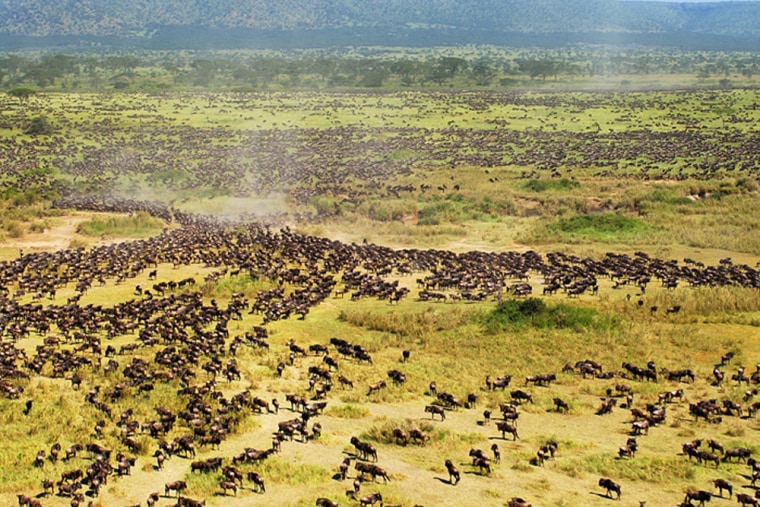The name of Tanzania's Serengeti National Park comes from a Maasai word meaning "the place where the land moves on forever." But a planned highway slicing through the expanse of grassy plains would only cause endless problems for the park's migratory wildlife, scientists say.
The growing call for reevaluation of the roads plan — the latest coming in the form of a letter from 27 scientists published last week in the journal Nature — aims to counteract growing political pressure in favor of the project in the final weeks before Tanzania's national elections next month, Britain's The Guardian newspaper reported.
Every year, huge herds of wildebeest and zebra migrate across the vast plain dotted with acacia trees and watering holes in search of water.
"The proposed road could lead to the collapse of the largest remaining migratory system on Earth — a system that drives Tanzania's tourism trade and supports thousands of people," The Guardian quoted the letter's authors as saying. "Such a collapse would be exceedingly regrettable for a country that has consistently been a world leader in conservation."
More than a million wildebeest and about 200,000 zebras follow the rains, migrating southward every fall, the park's website says, before returning west and north for spring and summer rains.
"So strong is the ancient instinct to move that no drought, gorge or crocodile-infested river can hold them back," according to the site.
Simulations show the road would cause a significant drop in the wildebeest population, from 1.3 million to less than 300,000, the scientists behind the report said, according to the BBC.
Construction is set to begin on the 260-mile road between Arusha, near Mount Kilimanjaro, and Musoma, on Lake Victoria, in 2012. The scientists said in Nature that the two-lane highway would cut through 31 miles of the park.
'Much better alternative'Tanzania's government has said the road is needed to connect the country's west with commercial activity on the eastern coast, and President Jakaya Kikwete has vowed to move forward with its construction. The Guardian noted that officials announced the project during the 2005 national election, which Kikwete won.
Opponents of the plan said an alternative route south of the park would be longer but would help preserve the income from the area's 90,000 annual tourists and ultimately link more people to trade, The Guardian report said.
"We're not against road being built, but there's a much better alternative that serves more people, that has a win-win-win of maintaining one of the biggest wildlife sights in the world and one of the biggest carbon sinks," The Guardian quoted Princeton professor Andrew Dobson, the lead author of the Nature letter, as saying.
Additionally, the northern road could provide easier access for poachers, conservationists have said, which could cause a "catastrophic decrease" in wildebeests and zebras, both from a stunted migration and animals being hit by vehicles.
"Once that starts to happen officials are going to want to put a fence up, and once you have a fence you stop the migration completely," Sarah Christie, a conservationist at the Zoological Society of London, said last month.
The society has joined the New York-based Wildlife Conservation Society and several other groups that earlier called on Tanzania to reconsider the plan.
UNESCO has expressed "utmost concern" about the project, The Guardian reported, prompting speculation that it could remove the park from its list of if the road is built.
Impact studiesA spokesman for Tanzania National Parks, Pascal Shelutete, said last month that the road won't be built until feasibility studies have been done.
"All the precautions will be taken care of. The government is aware of the importance of this portion of the road," Shelutete said. "The project won't take off until all the kinds of studies are carried out to see what will be the positive and negative impact of it."
But Tanzanian media have previously quoted officials as saying such feasibility studies have already been completed and that the road project is on track.
A Kenya Wildlife Service spokeswoman, Kentice Tikilo, said the road would negatively affect Kenya's Masai Mara, which sits directly above the Serengeti. Animals move back and forth over the border between the two parks. If the road is built and the animal populations dwindle, Masai Mara stands to lose animals and consequently fewer tourists will want to visit.
"At the end of the day we want to be sure conservation wins, whether it's on the Tanzania side or the Kenya side," Tikilo said. "We are all conservationists and we want to be sure we preserve our heritage."
